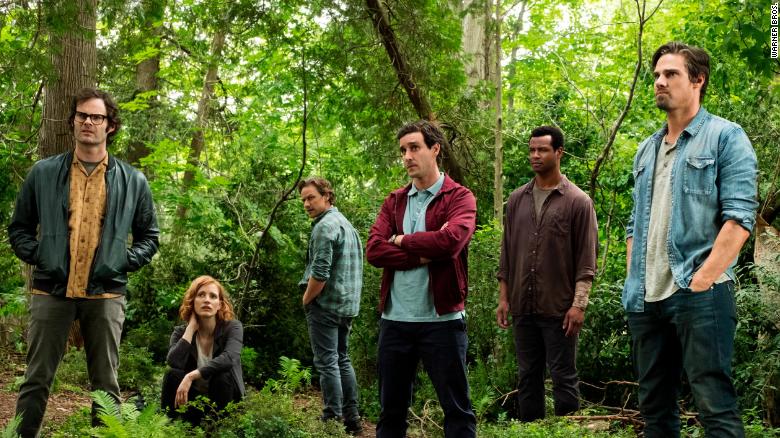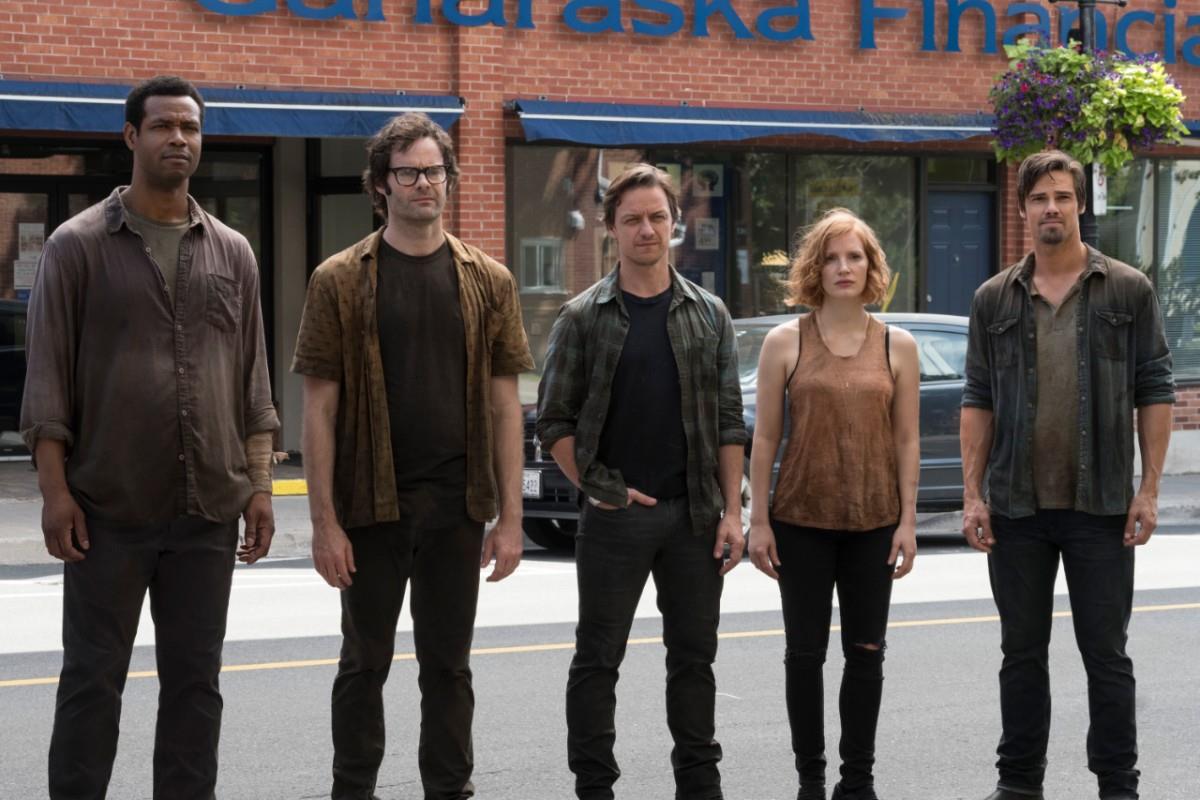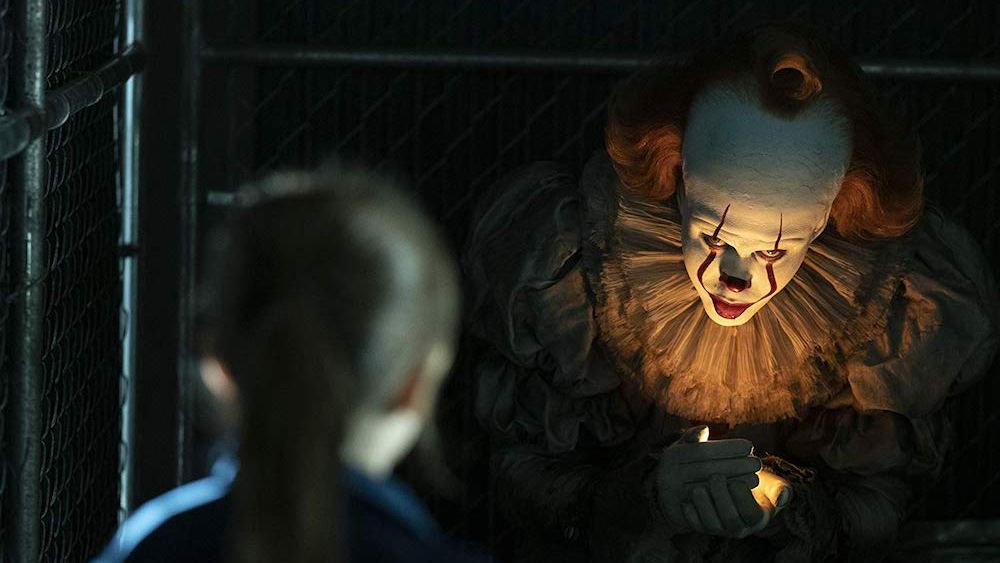IT: CHAPTER TWO (2.5 out of 5) Directed by Andy Muschietti. Written by Gary Dauberman; Starring Jessica Chastain, James McAvoy, Bill Hader, Isaiah Mustafa, Jay Ryan, James Ransone, Andy Bean, and Bill Skarsgård; Rated R for disturbing violent content and bloody images throughout, pervasive language, and some crude sexual material; Running time 170 minutes; In wide release September 6, 2019.
It: Chapter Two is as big, bold, and ambitious a horror film as audiences are likely to see this decade. From its all-star cast to its heavy implementation of extensive CGI, practically everything about the film makes it clear that after the runaway success of It: Chapter One, director Andy Muschietti and co. were given practically limitless resources to bring this second chapter screaming to life. And while it’s hard not to admire just how much they’re willing to bite off, one can’t help but feel that the vast majority of it is left thoroughly unchewed.
Which is not to say there aren’t great pieces here, there absolutely are. The score by returning composer Benjamin Wallfisch is a notable improvement over his prior work in Chapter One, embracing a more overtly Amblin-esque sound that far better complements the material. Checco Varese’s cinematography is consistently impressive, capturing the genre fare on both an unsettlingly intimate level and a more Lovecraftian epic scale in stunning fashion. The subtext of Gary Dauberman’s script is positively loaded with fascinating ideas: How does Pennywise evolve to remain relevant to each generation’s fears? What are the consequences of a community being both literally and figuratively founded upon the bones of evil and hatred? Are we all doomed to be swallowed whole by the thirty-year cycle of nostalgia?
All of these ideas are there, they’re just buried amidst the rubble of a shambling narrative structure that doesn’t do them any favors.
Despite the film’s three-hour runtime, it features a startling sparse plot. The entire first act is essentially just comprised of Isaiah Mustafa’s Mike individually and painstakingly calling each of the grown-up Losers, with all of the energy and vigor of a man literally checking boxes off on his to-do list. This immediately gets things off to a meandering start; it’s not hard at all to imagine a version of this opening in which we focus in on one of the Losers specifically getting Mike’s call and then get reintroduced to everyone else alongside them at the Jade. Instead, we’re given over thirty minutes of purely superfluous excess that wastes crucial screen-time introducing threads straight out of King’s novel (Bev’s abusive husband, Bill’s wife, each of the characters’ respective careers) only to then abruptly drop them for the remainder of its runtime.

A uniquely odd side-effect of all of this is that Muschietti’s direction, which was so confident in its intent in Chapter One, often feels kind of adrift here. It’s as if to try and compensate for the narrative, Muschietti has opted to try and make everything as visually impactful as possible. This results in some unique transitions through time and space as well as some complex camera moves but leaves precious few shots in the entirety of the film that aren’t either a close-up or an exaggerated camera movement.
Which isn’t to say his direction is without craft, far from it; when it works, it works. The MacGuffin-driven second act may grow narratively and thematically repetitive but it works fantastically well as an episodic showcase of Muschietti and Dauberman’s gift for staging thrilling horror setpieces. Moments such as Bev’s visit to her old apartment are genuinely great in isolation, it’s just that when these moments are stacked on top of one another, it all just becomes white noise. With seemingly every beat vying for maximum impact, none of them wind up leaving much of an impact at all.

Peppered in throughout the second act are a handful of moments that flashback to the young Losers Club. And while this doesn’t sound like a bad idea on paper, seeing just how likable that set of actors were in these roles, it winds up being a bafflingly ill fit in execution. For a set of films made as close together as Chapter One and Chapter Two were, the relationship between them feels bizarrely frayed. These flashback sequences add new beats into the plot of Chapter One that feel repetitive at best and insulting at worst. The idea that a character like Stan walked rebelliously out of his bar mitzvah off-screen halfway through Chapter One and that it in no way affected his character arc in that film feels like a disservice to the narratives of both films and Stan as a character.
It’s not until the film reaches its climactic third act that it truly gets to the meat of the story, making the prior two hours feel a bit pointless. Doubly so when it’s ultimately revealed that Mike lied about the Ritual of Chüd, meaning that despite its certain cinema-of-attractions quality, the second act’s series of setpieces in search of a series of MacGuffins was narratively unnecessary, thematically redundant, and (excluding Ritchie’s sequence) full of characters simply remembering slight variations on beats from the first film which they already remembered. What we’re left with is a film whose existence is only justified by its third act.
Admittedly though, it is a joyfully maximalist third act, practically bursting at the seams with jokes, scares, giant CGI monstrosities, and The Thing references. Its sheer sense of scale and the commitment Muschietti and co. bring to honing in on the hard-earned idiosyncratic tone they’ve been refining throughout the film is to be applauded. But it comes at the expense of the more tactile thrills these films have provided at their best.

Perhaps tellingly, the most powerful scene in the entire film is completely devoid of connection to both the rest of the film and King’s novel. The scene of Pennywise luring a young girl under a set of bleachers to her doom is absolutely riveting, thanks in no small part to Skarsgård’s entrancing performance. Despite Pennywise’s near-omnipotent presence in the narrative, Skarsgård feels routinely under-utilized here, either appearing in alternate forms or with the use of extensive CGI manipulation.
Which is a shame, because there’s something genuinely great living inside of It: Chapter Two. Between the ideas present in the subtext and margins of Daubleman’s script, Muschietti’s gift for staging standout sequences, Varese’s gorgeous cinematography, Wallfisch’s thrilling score, and utterly wonderful performances from the likes of Bill Hader, Jessica Chastain, and Bill Skarsgård, there’s so much greatness here that it’s hard not to be in awe of it all to some degree. But as it stands, It: Chapter Two is a culinary concoction full of a whole lot of delicious ingredients that was just pulled out of the oven a bit too son.